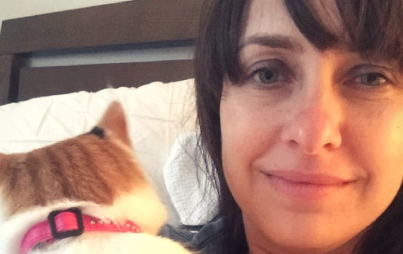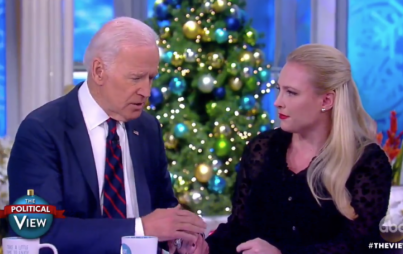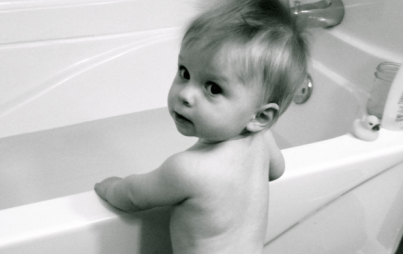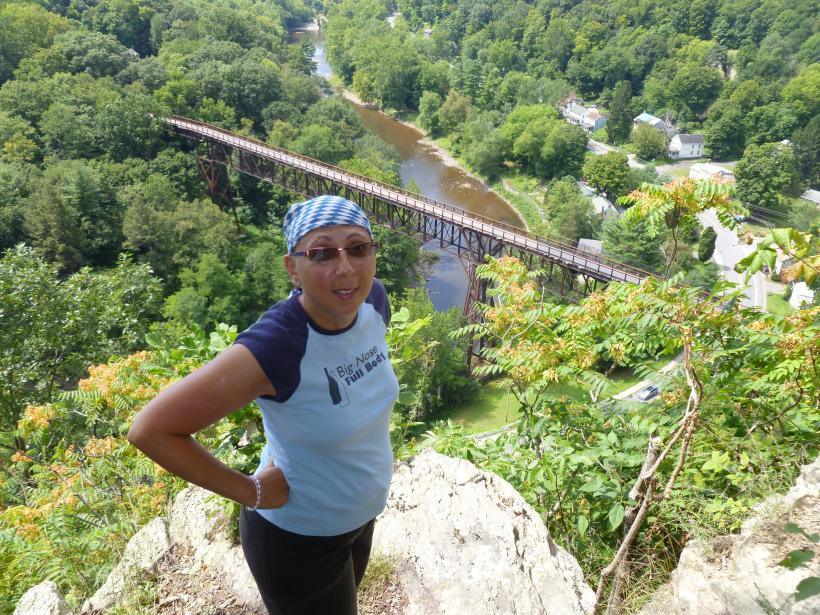
Atop Joppenbergh Mountain in New York, channeling Rosie the Riveter's fierceness
I wasn't going to let cancer—or chemo—get the best of me.
Nobody wants to hear those three, rather tiny, terrible words: "You have cancer."
But the truth is? It will happen to a lot of us. A woman's risk of getting ovarian cancer is one is 75, while one in eight will be diagnosed with breast cancer.
But learning that I needed chemotherapy was almost as bad as hearing my breast cancer diagnosis.
My first reaction was shock, then self-pity, anger, and disbelief. I couldn't imagine how I'd survive this nightmare. But after I got over the initial devastation, I pulled myself up by my big-girl panties, gritted my teeth, and got on with it. Eventually, I found myself at the other end of the tunnel. Don't get me wrong, chemo was no picnic—but it was do-able. I'm living proof—and so are thousands of others.
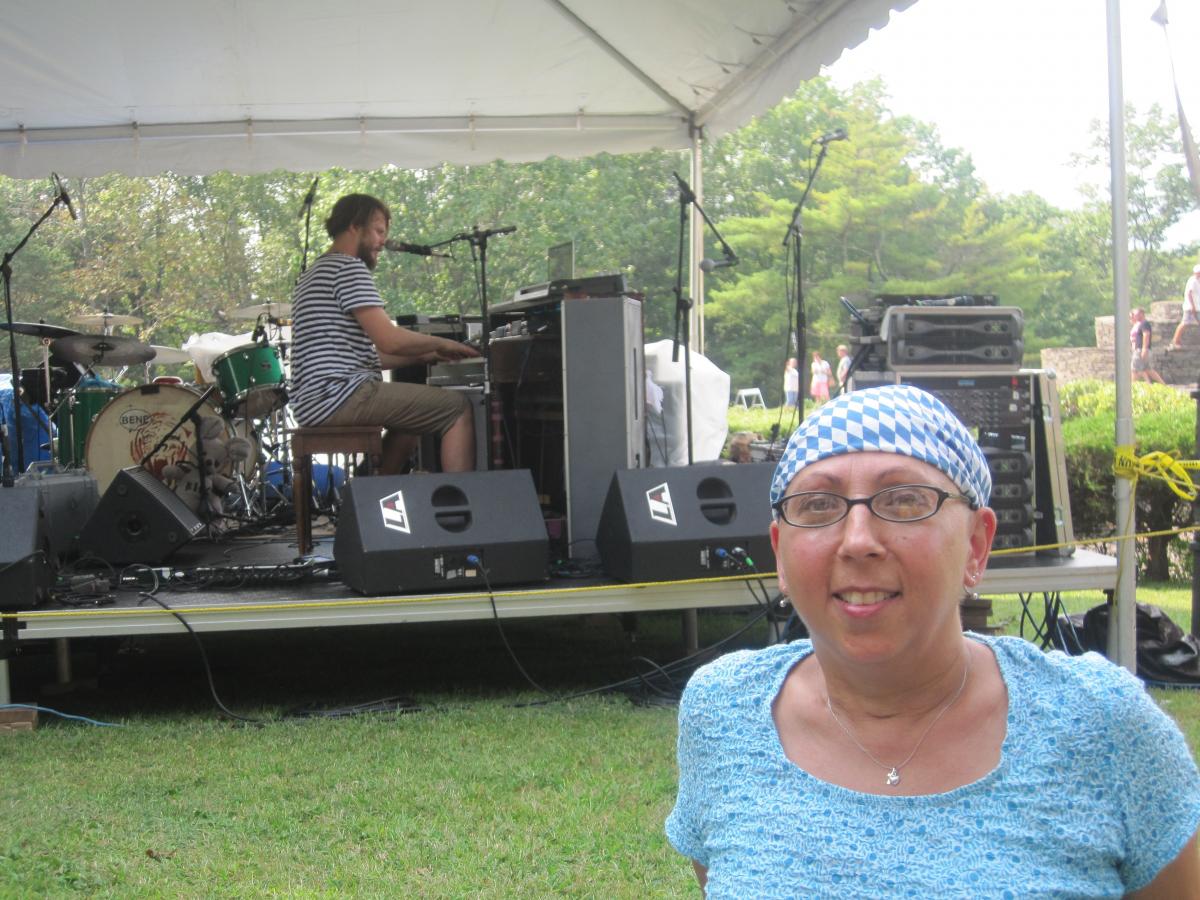 I admit I was insulted when people told me I had an "easy" time with chemotherapy. 'Easy for who?' I wanted to bark back. There were days every pore hurt, when I felt too fatigued to even move, when my joints were so sore I felt like an 80-year-old riddled with the flu; I cried bitterly because I was caught in a surreal swirl called "cancer treatment."
I admit I was insulted when people told me I had an "easy" time with chemotherapy. 'Easy for who?' I wanted to bark back. There were days every pore hurt, when I felt too fatigued to even move, when my joints were so sore I felt like an 80-year-old riddled with the flu; I cried bitterly because I was caught in a surreal swirl called "cancer treatment."
Looking back, I realized that I also had a fairly kick-ass attitude. I wasn't going to let cancer—or chemo—get the best of me. I armed myself with an arsenal of defense. The more I thought about it, the more I realized that I developed a slew of strategies that helped me get up each morning and get through each day.
1. Cop an attitude
Imagine yourself as a warrior, a goddess, a superhero, a totally swaggering badass. All of the above. Picture yourself as victorious, not a victim. A "poor me" mentality isn't going to help anybody, especially not you. Gird your loins and go.
2. Ask questions … but not too many
Educate yourself about your mode treatment. Ask your medical team questions, but don't get overwhelmed by the details. Learn as much information as you're comfortable with, but don't get bogged down by it. If you start freaking out, take a deep breath and step away from the Internet.
3. Say Yes
Don't be afraid to say 'yes' when someone offers to do something nice for you—like cook a meal, drop off a few groceries or drive you to a treatment. You'll be surprised at how good these small acts of kindness feel—for them and for you.
4. Say No
Don't be afraid to say 'no' when you're tired or when you simply don't feel like doing something. You only have a limited amount of energy and you have to pick and choose what you do. People will understand and if they don't, tough.
5. Get support
There are plenty of fantastic support groups out there, just waiting for you. Find one that's a good fit. At first, I frowned on them. "I don't want to sit around with a bunch of bald women bitching," I bitched to my husband. But I was pleasantly surprised with my first SHARE meeting—and almost two years later, I'm still going.
6. It's okay to cry—or yell
Once in a while you're going to be down in the dumps. You're going through hell and recovery is a hard road. Once in a while, you'll snap and shout at someone. Give yourself permission to boo-hoo and rant for as long as you need. (But not for too long.)
7. It's better to laugh
My son David was 13 when I was diagnosed. He could just look at me, tell I was hurting and suggest, "Let's watch The Cleveland Show," because he knew it would make me laugh, no matter how bad I felt. Find your own Cleveland Show. It could be I Love Lucy or CollegeHumor online. Discover your funny place let it take residence. Either you laugh or you cry, and laughter's a better alternative.
8. Ask for help
If you need help, ask for it. Now's not the time to be proud. The dynamics of your life have just changed, so don't expect to be able to do what you used to do. I remember having a mini breakdown when I realized that my hands were too weak to squeeze the oranges I needed for a recipe. "I can't even feed my family anymore," I wailed. What I should have done was asked someone to do it for me. End of story.
9. Do it with panache
When she was diagnosed with breast cancer on April Fool's Day 2005, post-porn modernist Annie Sprinkle decided to turn the experience into performance art. Not only did she and partner Beth Stephens take sensual photographs shaving each other's heads but they transformed Annie's infusion sessions into a chemo fashion show. Once, they wore clown noses and bunny ears, and another time, they dressed in tacky cruise wear. It not only kept up their spirits, but also cheered on Annie's fellow infusees. Find your own way to "own" your chemo.
10. Rock your bald head
Losing your hair could be almost as traumatic as losing a breast—but hair grows back. There's no point in bemoaning the fact that your hair will come out in clumps. It's gonna happen—but you can do it in style. Get a hardcore crew cut before you find handfuls on your pillow. Rock the hell out of your beautiful, bare head! Decorate it with temporary tattoos. Try out funky new wigs. Go pink pageboy or blue curls.
11. Don't get stuck on stats
Some people become junkies to the statistics—i.e. I was paralyzed with fear when I read that women diagnosed with Stage 1 breast cancer like me had an 86% survival rate. That meant in a room of 100, 14 of us would be dead in five years. I forced the thought out of my shiny pate, reminding myself that I was much more than a statistic.
12. Arm yourself with beauty
As much as I was able, I surrounded myself with gorgeousness. I went to museums to see paintings I loved, took in as many sunsets as humanly possible and went on gentle hikes to favorite spots whenever I could handle it physically. The calm, joyful feeling I got from infusing myself with loveliness eased my wounded soul.
13. Surround yourself with love
Yes, it does take a village. Assemble yours with people who adore you unabashedly and will stand by you, no matter what. Pals who would hold back your hair (if you had hair!) when you puked, will now drive miles to drop off Trader Joe puckers because they make your dry-as-ash mouth feel better. They will also kiss your bald head and tell you you're beautiful even when you know you're not.
14. Create your own Hit Parade
Develop a playlist that makes you feel fierce and hopeful. Michael Franti's infectiously inspirational song "I'm Alive" came out just before I started chemo and it became my anthem when I needed a lift. Whenever possible, I went to see live music that moved me: standouts were concerts by keyboard wizard Marco Benevento (I even took off my head wrap and danced like no one was watching!) and delicious songstress Dayna Kurtz.
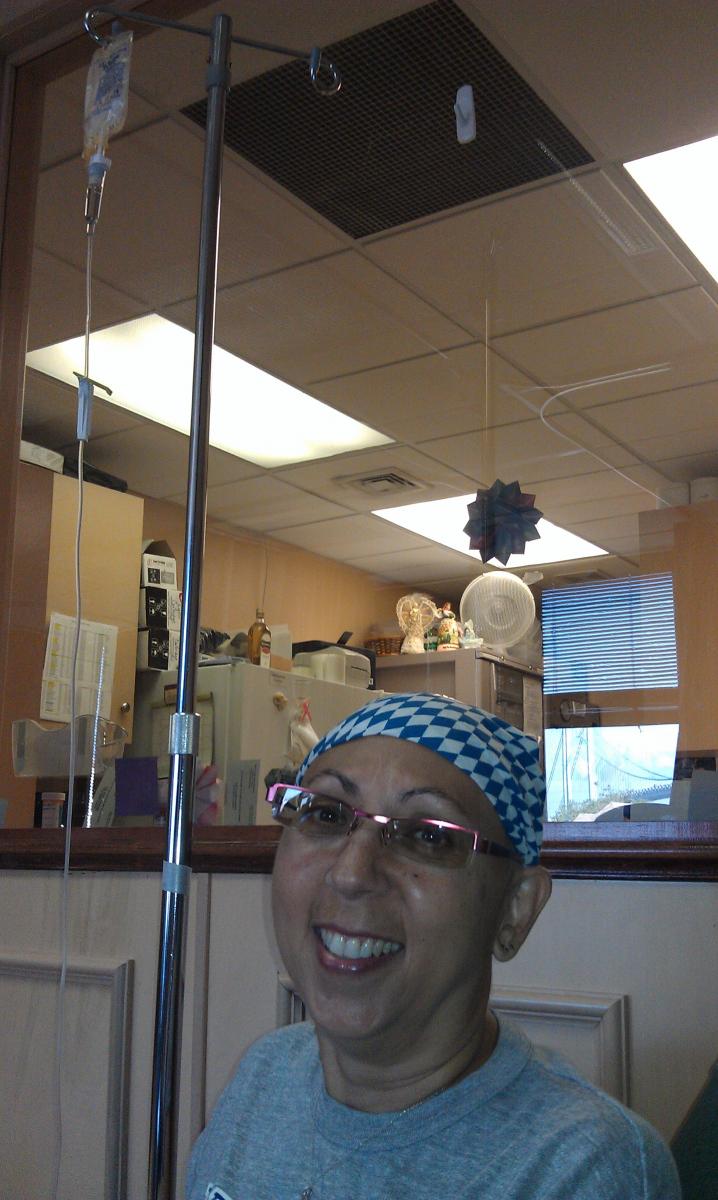 15. Eat a lot
15. Eat a lot
The steroids they gave me to fight nausea during chemo made me as hungry as a pregnant bear. But I tried to eat healthy, lots of fruits and veggies, plus treat myself to a scoop of Ben & Jerry's Phish Food every now and then to soothe my dry-mouth. Now's not the time to count calories. Just worry about making yourself healthy enough to weather your next chemo and to bolster your white blood count.
16. Or eat a little.
If nausea is gets the best of you, eat whatever appeals to you. Munch on good, clean food if you can, even if it's miniscule amounts. Watermelon, pineapple, rice pudding, whatever. Remember, this too shall pass.
17. No negativity
Surround yourself with optimistic people. I shied away from folks who urged me to call their brother's oncologist—even before my biopsy results were in—or those who dwelled in worst case scenarios when the star of the story always died in the end.
18. Watch this
One of my yoga buddies made an empowering short about how to be a cancer cheerleader when you or someone you know is diagnosed. Filmmaker Nicole Haran's "Do Great Campaign" focuses on keeping people positive around cancer. I watched it countless times to give myself an extra boost.
19. Don't comparison shop
Don't make the mistake of comparing your treatment regimen to someone else's. I've had people grill me with "So, why didn't you get a PET scan" and "Why did you have a mastectomy instead of a lumpectomy?" Your mantra should be: "Every cancer is different so every treatment is different." Share it freely with others. Or say it's none of their business (because it isn't!), like my oncologist suggested I do.
20. Get this book!
When my husband Peter and I came home from the surgeon after my diagnosis, he immediately got onto his computer and sent Deborah Cohen's Just Get Me Through This! to my Kindle. It became my Bible, my survival guide. Without Deb, I don't know how I would have gotten by. Now I send copies to friends who are diagnosed.
21. Don't be afraid to pull the Cancer Card
There's no doubt about it: cancer sucks. But there are a lot of people who give a lot of money to help make your ordeal better. Take full advantage of all the free stuff available to you, whether it be therapy, yoga, massages or anything else in between. The American Cancer Society has a great program called "Look Good…Feel Better" which gives free makeup and "how to" instructions (like how to pencil in nifty eyebrows when yours come out). Ride that wave of generosity for as long as you can!
22. Keep a journal
One of the nicest things anyone ever did for me was give me a journal. (Thanks, June!) In it, I wrote my musings, tracked my weight, energy level, BP and blood counts, plus how I felt each day so I could judge how I might feel on certain days following future infusions. I even wrote down deep, dark thoughts I wouldn't dare tell anyone else. But the very act of writing them down helped liberate me from them.
23. By any means necessary
Weathering cancer and chemo might be the hardest thing you ever have to do in your life. Get through it any way you can. Do what you have to, even if it means eating nothing but kumquats or binge-watching episodes of The Flying Nun. Don't judge yourself. Just do what you need to survive.
24. Be kind to yourself
You might forget a birthday. (Chemo brain isn't a myth.) You might not have the energy to make your niece's dance recital. You might not have the appetite to eat the special meal your husband prepared for your anniversary. Accept it. Let it go. They'll survive and you will, too. Be as forgiving of yourself as you'd be to someone else.
25. Look forward, not back
Don't waste time thinking about how gorgeous your hair used to be—try and imagine how healthy and strong it will be when it grows back. Celebrate how many chemo infusions you already have under your belt—not how many you have left to go. Look forward to a cancer-free future, not back towards your sickness!



